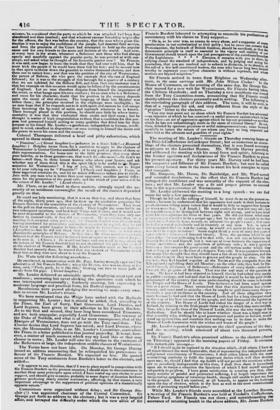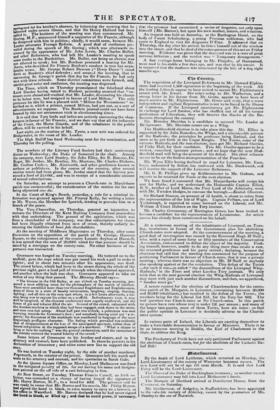The meeting of Mr. Leader's friends on Thursday evening began
at the Briti,lt Coffeehouse in Cockspur Street ; but so numerous an assem.
hlage of the electors presented themselves, that Hfuoruvy id found npereeesssaez
to adjourn to the Lowther Rooms. Mr. y
and addressed the meeting with his usual force and spirit, referring to the former opinions and declarations of Sir Francis Burdett to prove his present apostacy. For thirty years Mr. Harvey said he had been the supporter and follower of Sir Francis Burdett ; but now be called upon evet y honest man in the room to exert his best energies to reject that renegade.
Mr. Simpson, Mr. Hume, Dr. Bainbridge, and Mr. Ward moved and seconded resolutions, to the effect that Sir Francis Burdett had betrayed the confidence tind was unworthy of the support of the elec. tors ; and that Mr. Lender was a fit and proper person to succeed hint in the representation of Westminster.
Mr. Leader addreseed the meeting in a long speech : we can find room for only a few passages— Though he did not like talking of himself, he must do so on the present oe. cation ; because he understood that his opponents bird made it their 'business Ali g u about town telling many voters that it would be folly to support him because Inc was a mere boy. (A laugh.)
He must confess he was not very old ; but lie was old esioneli to distinguish between right and wrong, and to have acted upon his own opinions for three or four years. lie did trot know what some
p tem.a irsii consider to be a proper age ; but he was old eituugh to do that tt iaels he 11,,I already thine, namely, to advocate the people's omelets ; that cause he lied a :vacated as zealously aud as sincerely as any man. Yet, in spite of this teem laint that he woe to young, he would ask again at what age a man was fit t 5 he a rein% sentative ? Some might think a man of sixty. five years of to,.,e 51 .s het t r r!rum ante if five-and- twenty. Now, the question which be and t mei! tt he was adilitssing had to deal with, was not one as between Sir Francis Bo Art and Iiiineelf, but it was one at ieue between the euppoiters of hheral institutions fuel the upholders of arbitrary rule ; it was a question between a fire lesponsIble goverim emit and the old system under which they had so hsnnsg er.r 'tied in the time of a despotic Tory t ule. It was a contest between the many who thought that they should have a fair share in legislation, and the few, is Ito thiewlit they wete born to govern and the people to obey. On the me sale, they hi I !lauded ttgether all the Tories and the renegades from the ral ranks upholding their old Member ; on the other side, they hail, he flat- tered himself, all classes of Reformers—Reformers of every shatle—united to fern ard the pligress of Reform. That was the real state of the question at issue. lie know it had been objected to himself, that he had talked very openly in public meetings, and had said that lie thought it would be for the good oldie peel liniment of the country that, some understanding should be come to between the People :mil the Iluuse of Lurds. This declaratiou had been urged against him as a great crime. Many maintained that that this doctrioe was revolu- tiottary, and must tend to anarchy--that he sought to pull down every thing— to create a general confusion in the country,. And all these allegations were made In cause he had said that the House of Lords had for a long timepast stood in the Sit)' of the best intetests of the people, and had obstructed the legislation of the country. 'File House of Pads had risked the danger of a civil war Ireland, by refusing to the Irish people those rights to which they were entitled.. Now, when lie spoke thus of the Housed Lords, this was the very verge of hut Radicalism. And he should like to know whether there was a single man tn that aesembly who, wishing for good government and justice to Ireland, would stand up against him, and maintain that nothing was to be done to make the House of Lords harmonize with the wishes and wants of the people ? Mr. Leader repeated his opinions on the chief questions of the day; and the meeting, which consisted of about two thousand persons, broke up.
Sir Francis Burtlett's often-promised address to the electors (dated on Thursday) appeared in the morning papers of Friday. It contains this remarkable passage-
" If I should again be replaced in the situation which, of all others,! have at all times deemed the most honourable, that of representing the independent and enlightened cole.tituency of Westminster, I shall either labour with the most unremitting assiduity to fulfil the important duties which will then devolve upon me; or, should I find that my health will not permit the exertions which are so peculiarly indispensable at this time, I shall then deem it incumbent upon me to resign a situation the functions of which I find myself unequal ade9uately to perform. I have great satisfaction in assuring you that, after many months of painful and protracted suffering, I at length experience the invigorating symptoms of returning health, though still unable to put my foot to the ground. But I am resolved, at all hazards, to appear on the busting, upon the day of election, which is the best as well as the most constitutional mode of Presenting myself before you." While Mr. Leader's friends were assembled at the Lowther Rooms, a meeting of Sir Francis Burdett's was held at Fendall's Coffeehouse, Palace Yard. Sir Francis was not there ; and notwithstanding the assurance of returning health in the above address, Mr. Jones Burdett spoloord for his brother's absence, by informing the meeting that be jboured under severe Illness, and that Sir Henry Ha'ford bad been called in. The business of the meeting was then commenced. Mr. coring, M. P., announced himself a supporter of Sir Francis, although be disagreed with him in politics; chiefly, it would seem, because Mr. Leader advocates Peerage Reform. A good deal of confusion pre- vailed during the speech of Mr. Goring ; which was afterwards in- creased by the appearance of Mr. John Jervis, Mr. Charles Buller, and other Reformers, who had left Mr. Leader's meeting to speak some truths to the Burdettites. Mr. Buller, not being an elector, was not allowed to speak ; but Mr. Bonham procured a hearing for Mr. Jervis, who described Sir Francis Burdett's conduct in true but unpa- latable terms. Mr. George Robert Dawson (" Derry Down") stood forth as Burdett's chief defender ; and assured the meeting, that in canvassing St. George's parish that day for Sir Francis, be had only met with three refusals. Some district committees were formed, and, amidst great noise and confusion, the meeting was dispersed. The Times, which on Thursday promulgated the falsehood about Lord Dundas having ratted to Burdett, yesterday asserted that "ru- mours were abroad and credited, that Mr. Leader, discovering his chance to be below zero, had resigned in favour of Lord Milton." The only pretence for this lie was a placard with "Milton for Westminster" in. scribed on it, which a printer, named Milton, had put out, as a sort of advertisement, we suppose. The Burdett journal could not have been hoaxed by this not uncommon trick in electioneering times.
It is said that Tory lords and ladies are actively canvassing the shop- keepers in favour of Sir Francis ; and we dare say that all the influence of the Court, the Horse Guards, and of the subalterns in the public offices, will be exerted in his behalf.
Last night, on the motion of Mr. Tynte, a new writ was ordered for Bridgewater, in the room of Mr. Leader.
The High Bailiff has fixed Wednesday next for the nomination, and Thursday for the polling.



























 Previous page
Previous page